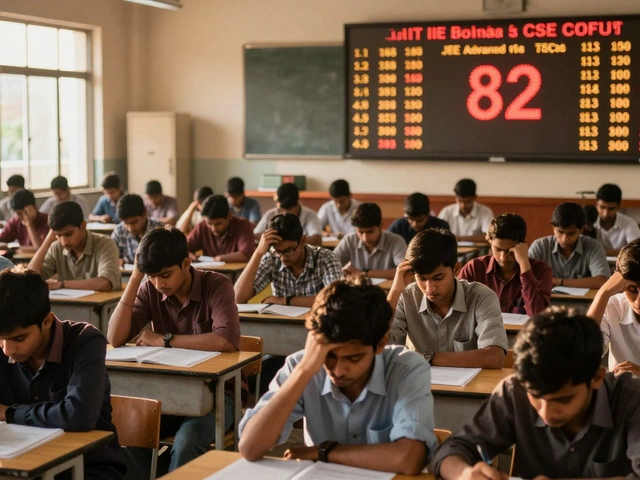Jun
18

- by Dhruv Ainsley
- 0 Comments
If you want to be a lawyer, it matters a lot where you try to get licensed. Not all bar exams are created equal. Some states have a brutal reputation that gives law grads nightmares, and no, it’s not just because of hard test questions. Rules, pass rates, and even local politics can stack the odds against you.
If you’ve ever joked that the bar exam is a form of torture, you’re not alone. A rookie mistake? Assuming the test is more or less the same everywhere. But one state's bar might feel like a stroll, while another’s could have you considering a whole new career. Knowing the toughest states can save you time, stress, and maybe even a ton of money before you apply.
Get ready for some numbers, real stories, and tips that cut through the noise about what makes a state actually tough to break into as a lawyer.
- Why Some States Make It So Hard
- Bar Exam Pass Rates by State
- California: The Notorious Nightmare
- Other Challenging States to Watch
- Tips for Surviving Tough Bar Exams
- Is the Hardest State Worth the Struggle?
Why Some States Make It So Hard
Not every state is out to make things impossible, but some put up roadblocks that go way beyond what you’d expect. It’s not just the exam itself—it’s also stuff like rules, weird requirements, and how they grade. And let’s not kid ourselves: some states basically want the best lawyers to stay local, so they raise the bar—sometimes literally.
Here’s what makes some states feel like a legal boss fight:
- Bar exam format and content: Some states add extra essays, make you write performance tests, or hit you with a wide range of state-specific laws instead of just national stuff. California, Texas, and Florida are famous for packing a ton of unique material into the test.
- High cut scores: Passing the bar isn’t about just barely getting through. Places like California set their passing score (called the “cut score”) higher than most. This means you can score the same as someone in another state and still fail.
- Strict eligibility rules: A few states are picky about where you went to law school. For example, if you studied at a non-ABA-accredited school or even online, states like New York or California might make you jump through extra hoops.
- Limited “bar exam forgiveness”: In some states, you get just two or three shots at passing before you have to reapply, pay new fees, or even demonstrate “moral character” all over again.
- Low pass rates: The numbers don’t lie. States like California and Alabama regularly have pass rates under 50% for first-timers, so you know it’s not just your imagination—it really is harder.
Here’s a quick look at some states’ pass rates and cut scores from recent years to give you an idea of how tough it really gets:
| State | Recent Pass Rate (%) | Cut Score (MBE Scale) |
|---|---|---|
| California | 43 | 1390 |
| Florida | 47 | 1360 |
| New York | 66 | 1330 |
| Texas | 70 | 1350 |
| Alabama | 45 | 1350 |
It’s not just about memorizing information. Rules, record-keeping, and sometimes just the luck of what’s on the test can make all the difference. If you’re thinking about where to take the plunge, don’t just look at job prospects—look at how high each state’s hurdles really are.
Bar Exam Pass Rates by State
People always ask if the bar exam is 'hard.' That's kind of like asking if spicy food is really spicy—it depends on where you taste it. Pass rates swing wildly from state to state, and the numbers tell a real story. In places where the test is hardest, even smart, hard-working grads can bomb out.
Take a look at how things shape up across the U.S. This table shows July 2024 bar exam pass rates for first-time takers, the stat every nervous law student stalks before the big day:
| State | Pass Rate (2024, First-Time Takers) |
|---|---|
| California | 64% |
| New York | 78% |
| Florida | 72% |
| Texas | 83% |
| Alabama | 87% |
| North Dakota | 89% |
| South Dakota | 91% |
| Delaware | 70% |
Notice California at the bottom—no surprise there. New York isn’t as bad as most expect, but Delaware has a pretty rough reputation too. Meanwhile, states like North and South Dakota? Practically a dream, if you’re only looking at the pass rate numbers.
Why do these pass rates matter? In tougher states, even great students don’t always make it through. The grading is strict, and the questions sometimes go off the rails compared to what you studied. On top of that, certain states pack in much more material to know, so there’s way more to cover before you can breathe easy.
If you’re dead set on becoming a lawyer in a state with a scary-low pass rate, it’s not just about studying hard. It’s about knowing what you’re up against and planning for it, right from the start.
California: The Notorious Nightmare
If you ask almost anyone in the legal world, they’ll tell you that California is the Everest of state bar exams. There's a reason why people swap horror stories about it at law school happy hours. This exam is long, intense, and has tripped up plenty of very smart folks.
First off, California’s bar exam is three days long—wait, scratch that, it used to be. Since 2017, it’s down to two days. But don’t get too excited. It still packs a punch, with five one-hour essays, a performance test, and two sessions of 100 multiple-choice questions each. California doesn’t let you get away with just knowing general law; you need to be sharp on all sorts of special topics and California-specific law that nobody else asks for.
What makes it especially tough is the bar exam pass rate. California passes way fewer people compared to most other places. If you look at the data, you’ll see why so many dread it:
| Year | First-Time Pass Rate (%) | Overall Pass Rate (%) |
|---|---|---|
| 2022 | 62 | 43 |
| 2023 | 61 | 42 |
| 2024 | 63 | 45 |
For comparison, some states let more than 75% of first-timers through. Even New York, another big legal market, usually sits around the mid-60s for overall pass rate. California sets a tough cut score—1390 out of 2000—which isn't just a number. It means hundreds of candidates who might have passed somewhere else end up missing the mark here.
Here’s what really scares people:
- California allows anyone with law study (including folks from non-ABA schools or who went the ‘reading law’ route) to sit, so the pool is huge and super mixed.
- The essays ask for nitty-gritty, weird local law no national bar review will cover in depth. Did you pay attention in Property or Professional Responsibility? You’d better.
- The exam fee is sky-high—over $1,200 just to sit for it in 2025. If you fail, you pay full price again.
If you want tips for surviving it, here’s what works for real-lawyer survivors:
- Don’t skip California-specific study. No, really. Their rules and model answers are very different than Massachusetts or Texas.
- Practice essays—lots of them. Time yourself and don’t only use national prep books. Use the actual past essays from the California bar site.
- Plan your budget. With the high application fees, hotel, and prep course, it’s easy to burn through thousands quickly. Don’t let financial stress distract you from studying.
If you do pass, you’ve got serious bragging rights. California lawyers are respected everywhere for a reason. But make no mistake—the state earned its reputation as the hardest just by grinding down even the best-prepped candidates.

Other Challenging States to Watch
Sure, California steals most of the spotlight, but plenty of other states make aspiring lawyers work hard for that license. Some states are known for their low pass rates, quirky rules, or just plain tough reputations. Before picking a state, it’s worth peeking at who else is making life tough for law grads besides the Golden State.
Here are a few states where the bar exam is anything but a cakewalk:
- New York: Everyone talks about the size, but the real kicker is the packed test and the Universal Bar Exam format. Even with the UBE, pass rates hover around 60-65% for first-timers. Toss in the crazy cost of living and it’s no vacation.
- Florida: This state’s bar exam has a reputation for killer essay questions and local law focus. Pass rates dipped around 44% in 2023 for all takers. If you don’t love Florida-specific rules, you’ll sweat through this one.
- Louisiana: Ever heard of the civil law system? Louisiana is the only one in the country using it, which trips up plenty of grads who studied common law. The pass rate danced around 55-60%, and the test itself takes three days.
- Texas: Yes, it’s part of the UBE now, but Texas sure likes to grill you on details. The test is still big, and while the pass rate is higher than some (about 70% for first-timers), the sheer number of test-takers means lots of competition.
- Virginia: You have handwrite the exam (no laptops here), which is rare in 2025. The state doesn’t use the UBE, and its scores cut off some out-of-staters. Pass rates roll between 65-75% for first-timers.
Want some quick stats? Here’s a look at recent pass rates and formats for these tough states:
| State | 2023 Pass Rate | Exam Format | Unique Challenges |
|---|---|---|---|
| California | 49% | California Bar Exam | Legendary for essays and performance tests |
| New York | 61% | UBE | Busy exam, big crowd |
| Florida | 44% | Florida Bar Exam | Florida law focus, hard essays |
| Louisiana | 56% | Civil Law, 3 days | Civil law system, not UBE |
| Texas | 70% | UBE | Big crowd, lots of in-state content |
| Virginia | 67% | Virginia Bar Exam | Must handwrite, not UBE |
If you plan to move states or work in a wildly specific field, knowing these stats can help you avoid nasty surprises. Think ahead, and maybe double-check if that law degree works everywhere you want to go.
Tips for Surviving Tough Bar Exams
Getting through the hardest state bar exams is no joke. If you’re staring down the California, New York, or Florida bar, you need a plan. Here’s what actually works—stuff countless new lawyers swear by, not just generic advice you’ll find in Reddit threads.
- Start early. Top scorers report studying at least two months solid, but most say 10-12 weeks is the sweet spot for heavy review and practice.
- Use practice tests from the real thing. For California, grab released essays and performance tests from the California Bar’s own website. For UBE states like New York, grab as many MBE questions as you can find—those are used by several states and they’re tough.
- Don’t skip the performance test. In California, that’s worth 26% of your score. Plenty of good students ignore it, thinking essays matter more, and regret it later.
- Keep it realistic. You don’t need 12-hour study days if you start early. Most folks find that 6-8 focused hours do more than endless cramming. Take breaks—a fried brain remembers nothing.
- Build a daily routine and stick to it. If you’re working while studying, block out your study time just as seriously as you would a job shift.
- Join a study group if you’re motivated by team energy—but bail if it turns into a gossip session. Some people do better solo, and that’s fine too.
- Outline your answers by hand. Writing out rule statements helps most people remember better than typing.
Here’s a look at average recommended study time for the toughest states:
| State | Weeks of Prep | Hours/Week | Notes |
|---|---|---|---|
| California | 10-12 | 45-60 | Performance test = 26% of score |
| New York | 8-10 | 40-55 | Uniform Bar Exam (UBE) |
| Florida | 8-10 | 40-50 | Unique multiple-choice and essay combo |
| Texas | 8-10 | 40-50 | Now UBE, but still tricky |
If you’re re-taking the exam, identify exactly where you missed points. Sometimes it’s not knowledge, but timing, or just freezing up. Plenty of people only pass on round two or three, especially in the hardest state bar exams. You’re not alone if it takes more than one try.
Don’t forget: self-care isn’t fluff. Getting enough sleep and moving your body makes a bigger difference than any $3,000 review course. If it helps, treat studying like marathon training, not a sprint.
Is the Hardest State Worth the Struggle?
So you’ve heard that California’s bar exam is the hardest in the country. But is chasing that badge of honor really worth it? Here’s the deal: passing the toughest bar exam means a serious grind, but it can bring some bragging rights and career perks—if you actually want to practice there.
Let’s be practical. California, for example, had a pass rate in July 2024 of just 51.8%. Compare that with Wisconsin, where law school grads from local schools get diploma privilege—no bar exam at all.
Before you sign up for a state that’s notorious for pain, consider what’s on the line:
- hardest state exams can make relocating later a hassle. Even if you pass, some states make you take their own test later if you move.
- Living costs matter. California, New York, and DC all have high bar exam difficulty and sky-high rents.
- You’ll often compete with more law grads for fewer top jobs. Prestige is cool, but so is getting hired.
Here’s a quick glance at bar pass rates and living costs in some key states:
| State | Bar Pass Rate (July 2024) | Average Lawyer Starting Salary | Average Monthly Rent (1BR Apt) |
|---|---|---|---|
| California | 51.8% | $108,000 | $2,700 |
| New York | 66.4% | $110,000 | $2,900 |
| Texas | 74.3% | $95,000 | $1,330 |
| Wisconsin* (Diploma Privilege) | Not needed | $76,000 | $1,260 |
*Wisconsin lets local law grads skip the bar entirely if they studied at an in-state school.
If you dream of working in Big Law, practicing in a huge state, or want to prove something to yourself, going for the toughest bar might make sense. But don’t think it’s automatically better or more respected everywhere. Most employers outside those states don’t care which bar exam you passed. Instead, weigh the jobs, lifestyle, and future moves you might want to make. Sometimes easier is smarter and less stressful on your wallet and your brain.





